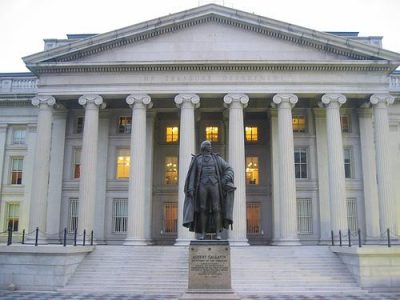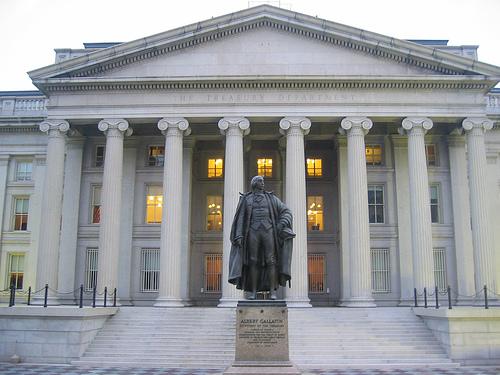Need a job? You might want to dial up WIN America, the business lobby that’s calling on Congress to declare a “tax holiday” on the profits U.S. firms have sitting overseas.
WIN America — short for “Working to Invest Now in America” — didn’t exist until earlier this year. Since then, the 18 major corporations and 24 trade associations that make up the group have spent a remarkable $50 million on their “tax holiday” campaign. They’ve hired, news reports last week revealed, 160 lobbyists.

The last tax holiday costed the U.S. Treasury a total of $92 billion. Photo by afagen.
Why does WIN America need all these insiders? To get a new “tax holiday” into law, the corporate giants that make up WIN America are going to have pull an inside job. WIN America’s proposed “tax holiday” may be the most outrageously rich people-friendly piece of legislation now pending before Congress.
That’s not, of course, how WIN America’s small army of lobbyists is positioning the measure. They’re claiming that corporations will “repatriate” all those profits they have overseas as soon as Congress gives them a tax “incentive” to do so. Those repatriated dollars, WIN America pledges, will help create jobs in America.
In theory, that sounds swell. But we don’t have to depend on theory to gauge the value of a corporate “tax holiday.” We can look to past practice. Incredibly recent past practice. Congress, turns out, gave Corporate America a tax holiday on overseas profits just seven years ago, in 2004.
That tax holiday handed 843 U.S. companies a tax break that cost the U.S. Treasury $92 billion. What did American taxpayers get back? Not much. In fact, the Institute for Policy Studies revealed last week, not anything at all. Most of the firms that claimed a tax holiday in 2004 went on to reduce their workforces.
America Loses: Corporations that Take ‘Tax Holidays’ Slash Jobs, looks at the 58 corporate giants that together accounted for almost 70 percent of the overseas profits repatriated after the 2004 tax holiday.
These 58 job destroyers — led by Citigroup, Hewlett-Packard, Bank of America, Pfizer, Merck, Verizon, Ford, Caterpillar, Dow Chemical, and DuPont — went on to shed almost 600,000 jobs after their tax holiday tax break.
But don’t these companieshave a perfectly reasonable defense? Haven’t we experienced a Great Recession since 2004? We surely have. But these 58 corporate giants aren’t hurting. They’re currently holding over $450 billion in spare, excess cash.
Of the 58 big firms that the new IPS report puts under the microscope, notes co-author Scott Klinger, only eight reported losses between 2008 and 2010 — and 43 have registered profits every single year through Great Recession hard times.
“If companies were struggling, and unprofitable, then dramatic downsizing might be warranted,” adds Klinger. “But when companies are prospering, sitting on record levels of cash and saying they need tax cuts to hire workers, their argument makes no sense.”
Tax holidays, on the other hand, do make sense for top execs. A huge share of the overseas profits these execs generate come, the new IPS report notes, “from accounting acrobatics that shift profits generated from sales in the United States to foreign tax havens where corporations face little or no income tax.”
Tax holidays give these executives a second bite at the tax-avoidance apple. They don’t pay taxes overseas or, thanks to tax holidays, back home either. Tax holidays, as IPS report co-author Chuck Collins puts it, give preferential treatment to companies “built to loot” over companies “built to last.”
The new IPS America Loses study suggests a variety of steps we ought to be taking to end this preferential treatment. Passing one key reform now before Congress, the Stop Tax Haven Abuse Act, would shut off most of the tax loopholes that encourage profit shifting overseas — and raise an estimated $100 billion a year.
Congress can do a great deal, the new IPS report sums up, “to strengthen the U.S. economy and create and protect jobs.” But a “tax holiday” that rewards CEOs who pile up profits by shedding jobs and sashaying around the tax code only strengthens — and protects — our most shameless corporate looters.
